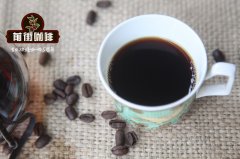What are the flavor characteristics of Yemeni coffee beans? how much is a cup of Yemeni mocha coffee beans?

Professional coffee knowledge exchange more coffee bean information please follow the coffee workshop (Wechat official account cafe_style)
As long as Yemeni coffee beans are immediately reminiscent of thick and wild sun beans, Yemeni coffee farmers have been planting according to the ancient methods handed down by their ancestors since ancient times. Because Yemen's rugged terrain is not easy to grow and rainfall is scarce, Yemeni coffee farmers choose terraces or lowlands for planting, and choose areas that are not easily exposed to strong sun exposure, while most Yemeni farmers are poor and cannot use pesticides. Almost all of them are cultivated naturally and organically.
Matali is the best-known and highest coffee producing area in Yemen, located in the Bani Matar, west of the capital Sana'a, with a slender bean shape and a strong, thick flavor with obvious berry aromas.
Flavor description: rich and full-bodied palate with clean flavor lines, low acid value, but charming fruit flavor, berry, blackcurrant, chocolate, honey, fruity and lingering finish
One of the driest countries in the world
Yemen is one of the driest countries in the world. Economically, the country currently relies on oil exports for three-quarters of its income, but the World Bank predicts that stocks will be used up around 2017. In a country that used to be self-sufficient in farming, 80% of its crops now have to be imported. The reasons include population expansion and water shortages caused by local misuse of Qat, a crop as old as coffee.
Chart grass is a social drug commonly used by residents of the Arabian Peninsula. Yemenis like to open rooms for banquets at home, chewing chatgrass and gossiping with friends. It contains the stimulant Cathinone, which is as refreshing as a light amphetamine. However, when the power of the drug weakens, the person who takes it will feel depressed. Although the World Health Organization (WHO) does not list it as a drug, it has been banned in many Western countries.
On the other hand, Yemen has been plagued by drought since ancient times. Its major cities rely on underground water, of which agriculture takes up 90% of the water, while growing Qat alone has already spent a lot of water, and authorities expect the underground water in the capital, Sana'a, to be used up by 2017. Most of Yemen's cities are built on high mountains, and residents rely on well water from the government or the private sector for a living. The country has as many as 40,000 to 70,000 wells, some as deep as 600 metres underground. In addition, pumping water up the hill is expensive, with the government spending as much as $7 billion a year on drilling and pumping water. Therefore, in recent years, the local government has decided to ban chartgrass, which is a waste of water and cannot satisfy hunger, and replace it with other crops. Coinciding with the rise of the boutique coffee boom, the Yemeni government is now trying to encourage farmers to switch to coffee, which consumes half as much water as Chategrass.
Follow the most primitive way of production
Real Yemeni coffee beans are not common. After the fruit is ripe on the trees, the farmers harvest it by hand and dry it on the roof of the stone house built by the mountain. The process of shelling meat depends entirely on crude stone grinding equipment. Due to inconvenient transportation, coffee will generally change hands several times, mixed with uneven size, new and old beans. In addition, there are many defects and improper handling. If measured by modern cup standards, Yemeni coffee beans are difficult to reach the grade of fine products. But high-quality Yemeni coffee beans have a unique flavor: complex Middle Eastern spices, bacon, ripe fruit, wine, cocoa, mellow taste and sweet taste. Like durian and stinky tofu, people who like and hate go to extremes.
High quality Yemeni coffee beans have a unique taste.
In terms of producing areas, Mattari to the west of the capital is dominated by heavy taste and cocoa. Harazi has higher acidity and thinner taste. Others are Dhamari (also known as Anisi), Ibb and Sana'a named after the capital. But Sana'an is not a producing area, but a middleman who mixes fruits collected by neighboring villages for export, just like Yemeni coffee in the past, using the port name Mocha.
Yemeni coffee bean brand recommendation
The Yemeni mocha beans baked in Qianjie Coffee are fully guaranteed in terms of brand and quality. And more importantly, the performance-to-price ratio is extremely high, a pack of 227 grams, the price is only 85 yuan. According to the calculation of 15 grams of powder per cup of coffee, a bag of coffee can make 15 cups of coffee for less than 6 yuan each, which is recommended by conscience compared to the price of tens of yuan a cup sold in a coffee shop.
Important Notice :
前街咖啡 FrontStreet Coffee has moved to new addredd:
FrontStreet Coffee Address: 315,Donghua East Road,GuangZhou
Tel:020 38364473
- Prev

What is the Ismaili of Yemeni coffee beans? Which brand of Yemeni coffee beans tastes good?
Professional coffee knowledge exchange more information on coffee beans Please follow the coffee workshop (official Wechat account cafe_style) mention Yemeni coffee beans remind people of mocha coffee. The word Mocha has many meanings. Around 600 AD, the first coffee bean far from its hometown Ethiopia took root in Yemen on the other side of the Red Sea, and coffee was made all over the world.
- Next

Panama Alida | 100-year-old Super Fine Coffee producer Alida Manor Solar Iron pickup
Panama Elida Estate Panamanian Alita Manor: Panamanian Poquet Manor: Panamanian Pokuit Manor: Alida Manor elevation: 1850 m Variety: tin truck treatment: sun 01 | production area introduction Pokuit Boquete is a town of Chiriqui in Chiriki province, located near the border between Panama and Costa Rica, near the famous Baru Baru.
Related
- Detailed explanation of Jadeite planting Land in Panamanian Jadeite Manor introduction to the grading system of Jadeite competitive bidding, Red bid, Green bid and Rose Summer
- Story of Coffee planting in Brenka region of Costa Rica Stonehenge Manor anaerobic heavy honey treatment of flavor mouth
- What's on the barrel of Blue Mountain Coffee beans?
- Can American coffee also pull flowers? How to use hot American style to pull out a good-looking pattern?
- Can you make a cold extract with coffee beans? What is the right proportion for cold-extracted coffee formula?
- Indonesian PWN Gold Mandrine Coffee Origin Features Flavor How to Chong? Mandolin coffee is American.
- A brief introduction to the flavor characteristics of Brazilian yellow bourbon coffee beans
- What is the effect of different water quality on the flavor of cold-extracted coffee? What kind of water is best for brewing coffee?
- Why do you think of Rose Summer whenever you mention Panamanian coffee?
- Introduction to the characteristics of authentic blue mountain coffee bean producing areas? What is the CIB Coffee Authority in Jamaica?

